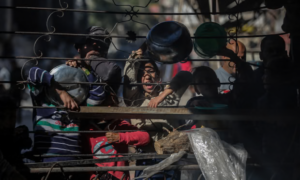What does justice for gender persecution truly look like?
Is it about ensuring survivors’ voices are heard? Proving intent behind crimes that target individuals based on their gender? Or breaking down the systemic barriers that prevent accountability?
These questions were at the heart of the ASP side event, “Gender Persecution Principles: Increasing Prevention and Ensuring the Protection and Participation of Survivors”.
Co-sponsored by Women’s Initiatives for Gender Justice, MADRE, the ICC Office of the Prosecutor (OTP), and the UK Government’s Foreign, Commonwealth & Development Office, the event reflected on the progress made since the ICC OTP’s groundbreaking initiative launched in January 2024.
This initiative invited civil society’s contributions to advancing accountability for gender-based persecution, and this side event marked the release of the Civil Society Recommendations Report, which builds on insights from a global series of convening culminating in this collective roadmap from civil society to guide the formation of principles.
Moderated by Alix Vuillemin, Executive Director of Women’s Initiatives for Gender Justice, the event brought together an exceptional panel of experts:
- Nazhat Shameem Khan, ICC Deputy Prosecutor
- Prof. Lisa Davis, Special Adviser on Gender Persecution
- Prof. Rene Fernando Urueña Hernandez, Special Adviser on Complementarity
Key takeaways
- Gender Persecution Goes Beyond Sexual Violence
Gender-based persecution isn’t just about sexual violence – it’s woven into systems of oppression that affect every aspect of life. From economic inequality to religious persecution, these crimes reflect how deeply rooted discrimination manifests in conflict. - Intersectionality is Essential
Justice for survivors requires an intersectional approach, recognizing how gender roles intersect with race, ethnicity, religion, and other factors. For example, crimes targeting Afro-descendant communities often can’t be separated from racism and economic marginalization. - Survivor Participation is Critical
Survivors’ voices need to be front and center – not just to inform legal strategies but to redefine how we understand and prosecute gender persecution. - The Legal Challenges are Real, but Progress is Possible
Proving intent in gender persecution cases is a high bar under international law, but speakers offered powerful examples of how discriminatory patterns and survivor testimony can build compelling cases.
Looking Ahead
The report unveiled at this event offers a roadmap for integrating the Women, Peace, and Security (WPS) pillars into efforts to tackle gender persecution: prevention, protection, participation, and relief and recovery.
The event left us with a renewed commitment to ensuring that accountability for gender persecution becomes a reality – not just in courtrooms, but in the lives of survivors.
Read the full report here.
Source: https://4genderjustice.org/our-latest-posts/asp-side-event-gender-persecution-principles/




